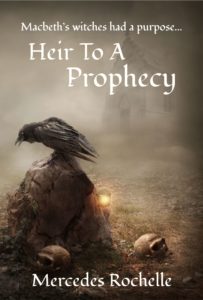 It is of legends that I write in this story, rather than facts; for after almost a thousand years of history, what can we call truth out of the tiny scraps that survived? When men claimed descent from a bear, and people believed that dragons roamed the earth, who is to say what is fact and what is fancy? Hence, with this thought in mind, I give you the origin of the royal Stewarts, as it was handed down to Shakespeare.
It is of legends that I write in this story, rather than facts; for after almost a thousand years of history, what can we call truth out of the tiny scraps that survived? When men claimed descent from a bear, and people believed that dragons roamed the earth, who is to say what is fact and what is fancy? Hence, with this thought in mind, I give you the origin of the royal Stewarts, as it was handed down to Shakespeare.
It all began with the witches’ prophecy.
Macbeth’s friend Banquo was with him when the three witches appeared on the heath – strange, weird creatures with seductive words.
“All hail, Macbeth!” the first had said, “Hail to thee, Thane of Glamis!” – calling him by his true title.
“All hail, Macbeth!” quoth the second, “Hail to thee, Thane of Cawdor!” – giving him a title belonging to another.
“All hail, Macbeth,” cried the third, “that shalt be King hereafter!” – giving voice to his secret desire.
Macbeth did not know it yet, but the second witch had spoken the truth; already King Duncan had declared the Thane of Cawdor traitor, and awarded the title to Macbeth for his courage in battle.
Then the witches spoke their prophecy to Banquo. They said:
“Lesser than Macbeth, and greater.”
“Not so happy, yet much happier.”
“Thou shalt ‘get kings, though thou be none.”
The witches vanished, leaving the pair with gladsome prospects.
All might have gone well, but Macbeth’s ambitions were too strong to wait for chance to bring them about. King Duncan’s life stood in his way; before long, King Duncan was murdered. The true heirs, Malcolm and Donald Bain, fled the country, thus leaving the throne empty for Macbeth to mount.
Only Banquo had reason to suspect that Macbeth was the murderer.
As of yet, however, good Banquo showed no signs of betraying his friend’s secret. But as time went on, the king brooded – hating him – begrudging Banquo’s every breath.
It really wasn’t treachery Macbeth suspected; rather, his anger had sprung from the futility of his own position. Although he was king, he had thrown away his peace of mind – jeopardized his very soul – so that Banquo’s heirs would sit on the throne he had bought so dearly.
Having gone so far, there was only one thing to do. Banquo had to be dealt with…and his son, Fleance. To that end, Macbeth ordered a great feast to be prepared, and commanded their presence as guests of honor…
(Hence my story. Shakespeare did not pursue the Banquo/Fleance theme, because I believe it was common knowledge in post-Elizabethan England that Banquo was the ancestor of James I Stewart. This is how it began…)